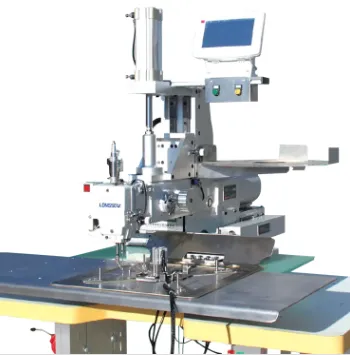Automatic Pattern Sewing Machine: Revolutionizing Textile Manufacturing with CNC Technology
The automatic pattern sewing machine has transformed the textile industry by combining precision, efficiency, and automation. At the heart of this innovation is the CNC sewing machine, which uses computer numerical control (CNC) to automate stitching patterns with exceptional accuracy. From intricate quilting designs to complex upholstery projects, CNC sewing machines enable manufacturers to produce consistent, high-quality products at scale. Understanding the different types of CNC machines, including the industrial CNC sewing machine and CNC quilting machine, is essential for businesses looking to optimize their production lines.

What Is a CNC Sewing Machine?
A CNC sewing machine is a computer-controlled device designed to perform sewing operations following programmed patterns. Unlike traditional sewing machines, CNC machines can execute highly detailed stitching, embroidery, and quilting with minimal human intervention. The precision offered by CNC control ensures uniform stitch quality, reduces material waste, and speeds up production times. This technology is especially valuable in industries where complex designs and repetitive patterns are common, such as upholstery, fashion, and automotive textiles.
Types of CNC Sewing Machines and Their Applications
There are several specialized CNC sewing machines tailored to different manufacturing needs. The CNC quilting machine is designed to automate quilting patterns on bedspreads, mattresses, and furniture padding, providing consistent and decorative stitching. The CNC upholstery sewing machine caters specifically to heavy-duty fabrics and complex curves found in furniture production, delivering precise seam alignment and strength.
An industrial CNC sewing machine is built for continuous operation in high-volume factories. These machines are rugged and feature advanced software interfaces for pattern design and editing. Manufacturers often seek information about CNC sewing machine price to balance cost with desired features, ensuring they select equipment that fits their budget and production goals.
Purchasing and Using CNC Sewing Machines
When looking for a CNC sewing machine for sale, businesses consider factors such as machine speed, stitch complexity, fabric compatibility, and software ease of use. CNC machines reduce reliance on manual labor, increase repeatability, and open new possibilities for custom and intricate designs. Operators program or import patterns, and the machine follows the instructions precisely, drastically reducing errors and production time.
CNC Stitching: Precision Meets Productivity
CNC stitching machines are redefining quality standards in textiles by offering automation without compromising artistry. They support diverse sewing tasks—from simple seams to elaborate decorative stitching—across a wide range of materials. The combination of automated pattern execution and consistent stitch formation makes CNC sewing an essential technology for modern textile manufacturing.
In summary, automatic pattern sewing machines powered by CNC sewing technology represent a major leap forward in sewing automation. Whether you need a CNC quilting machine, industrial CNC sewing machine, or CNC upholstery sewing machine, these tools deliver unmatched precision, speed, and flexibility. Understanding the capabilities and pricing of CNC sewing machines is key for businesses aiming to enhance production efficiency while maintaining superior stitch quality.
-
Automatic Pattern Sewing Machine: Unlocking New Possibilities with CNC Sewing TechnologyNewsAug.26,2025
-
Automatic Pattern Sewing Machine: Enhancing Efficiency with Advanced CNC Sewing SolutionsNewsAug.26,2025
-
Lock Stitch Sewing Machine: Precision and Performance in Industrial StitchingNewsAug.26,2025
-
Lock Stitch Sewing Machine: Enhancing Efficiency with Advanced Stitching TechnologyNewsAug.26,2025
-
Lock Stitch Sewing Machine: Advancing Sewing Technology for Industrial ExcellenceNewsAug.26,2025
-
Lock Stitch Sewing Machine: Essential Technology for Precision StitchingNewsAug.26,2025
-
Precision and Durability with Auto Upholstery Sewing MachinesNewsAug.26,2025


























